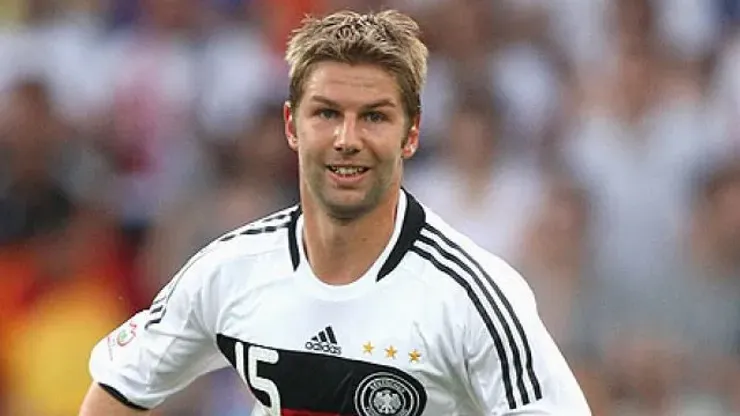Four months after retiring from the sport, Thomas Hitzlsperger today revealed that he is gay.
In a newspaper interview with Die Zeit, the former Aston Villa, Everton and Germany midfielder said:
“I am expressing my sexuality because I want to promote the discussion of homosexuality among professional athletes.
“Only in the last few years did it dawn on me that I would rather live with a man.”
The news spread through the soccer world earlier today. His revelation was met with mature reactions across the board, which shows how far the sport has come in a short period of time.
Many of us who are long-time fans of the sport recall the taunts Graeme Le Saux received from opposing fans following an incident provoked by Liverpool’s Robbie Fowler in 1999.
Le Saux’s crime was actually unrelated to homosexuality. His crime was that he was intellectually curious and highly educated when contrasted to most of the players, staff and fans around the game during his career. In the 1990s, English football supporters were moving into an era without noticeable and obvious racist chants from the terraces and were transitioning into the multi-cultural and international Premier League era. But when it came to homosexuality, people around the game were still very ignorant and worse yet intolerant about the subject. In some cases, the game seemed devoid of the ability to be openly racist; fans simply switched to anti-gay slurs as a substitute.
Le Saux, the former Blackburn and Chelsea defender who now works as a co-commentator for NBC Sports, shared his thoughts about this situation in a 2007 interview where he admitted the slurs almost led him to an early retirement.
More recently, Sol Campbell endured homophobic taunts from Tottenham supporters in 2008. Campbell, who had come up through Tottenham’s youth system, controversially left the club and joined rival Arsenal.
Interestingly that same year, I was subject to homophobic taunts on the London Underground’s Bakerloo line leaving Wembley Central station after England had defeated the USA 2-0. I was wearing a US jacket and endured chants of “you are gay, you are gay,” from a group of English teens until I left the train at Paddington Station. What was noticeable were the few foreign tourists on the train, two Germans and an Asian woman, who were very embarrassed and started talking to me to make a point in front of the youngsters.
Campbell’s younger brother had been jailed three years earlier for assaulting a classmate who accused the elder Campbell, then playing for Arsenal, of being gay. That was around the same time that the News of the World ran a story about Ashley Cole, then also playing for Arsenal, engaging in a gay orgy. Cole sued the now defunct News Corp-owned publication and won the case.
After the 2006 World Cup, the News of the World’s sister News Corp-owned publication The Sun accused Cristiano Ronaldo of being a “nancy boy,” a gay slur that has been used in British society.
Most famously, footballer Justin Fashanu committed suicide after all the fans and media scrutiny of his homosexuality impacted his psychology.
While it seems a lack of education coupled with the popular appeal of the sport to working class fans has caused much of this ignorance, the maturity by which Hitzlsperger’s announcement has been met is a very good sign. English football continues to put the dark days of the past in the rear view mirror, which is a victory for the game and society as a whole.
Editor’s note: Read the latest Germany national team news, analysis and opinion.
200+ Channels With Sports & News
- Starting price: $33/mo. for fubo Latino Package
- Watch Premier League, Women’s World Cup, Euro 2024 & Gold Cup
The New Home of MLS
- Price: $14.99/mo. for MLS Season Pass
- Watch every MLS game including playoffs & Leagues Cup
Many Sports & ESPN Originals
- Price: $10.99/mo. (or get ESPN+, Hulu & Disney+ for $14.99/mo.)
- Features Bundesliga, LaLiga, Championship, & FA Cup
2,000+ soccer games per year
- Price: $5.99/mo
- Features Champions League, Serie A, Europa League & Brasileirāo
175 Premier League Games & PL TV
- Starting price: $5.99/mo. for Peacock Premium
- Watch 175 exclusive EPL games per season






